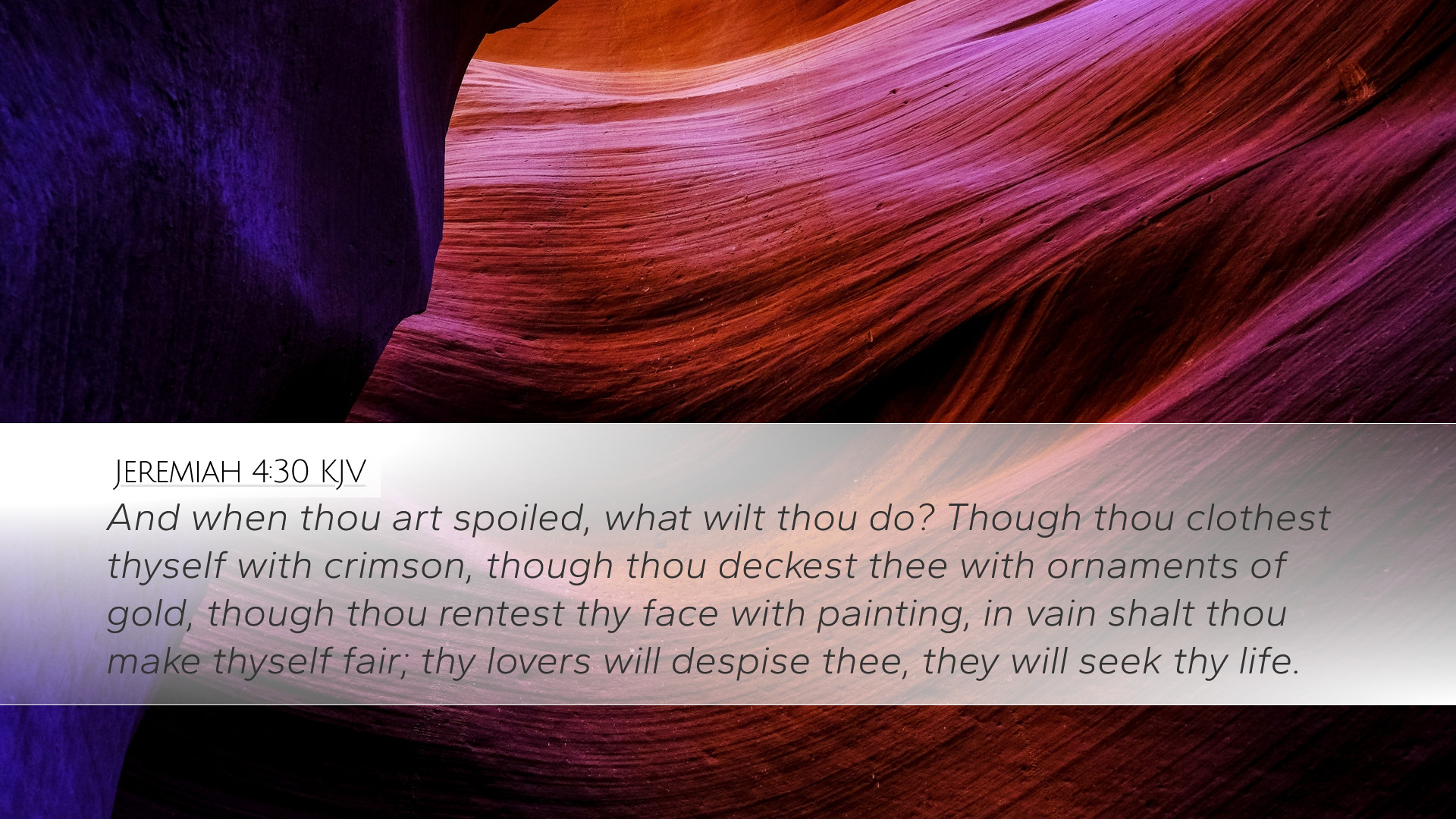Commentary on Jeremiah 4:30
Verse Text: "And when you are spoiled, what will you do? Although you cloth yourself with crimson, although you decorate yourself with ornaments of gold, although you enlarge your eyes with paint, in vain you make yourself beautiful; your lovers despise you; they seek your life."
Introduction
The verse Jeremiah 4:30 serves as a poignant admonition against the futility of seeking external beauty and security while being spiritually bankrupt. This passage embarks on a reflection of the dire consequences of Israel's unfaithfulness to God, capturing the essence of divine judgment through vivid imagery and rhetorical questions.
Exegesis of Jeremiah 4:30
This verse poses a critical question to a nation that has turned away from its God. The rhetorical nature of "what will you do?" underscores the inevitable reality that comes when one relies on superficial means to counteract a profound spiritual crisis.
1. The Terrible Reality of Spoiling
In this context, the "spoiling" refers to the devastation that results from judgment. It evokes imagery of a once-thriving nation brought to ruin. Matthew Henry emphasizes that despite external appearances, all attempts at beautifying oneself are worthless if one's heart is estranged from God. This reflects a deeper spiritual decay where the nation attempts to mask its moral failure with external adornments.
2. The Futility of External Adornments
Henry further elaborates on the futility of "clothing yourself in crimson" or adorning oneself with "ornaments of gold." Albert Barnes echoes this sentiment, noting that attempts to beautify oneself in a time of judgment are ultimately vain. The Hebrew Scriptures frequently illustrate the contrast between outward beauty and inner character.
Theological Implications
This passage starkly illustrates the consistent Biblical principle that God desires inward purity over outward adornment (see 1 Samuel 16:7). It reminds pastors and theologians alike that genuine repentance and a return to God are the only solutions to spiritual desolation.
3. The Response of "Lovers"
The term "lovers" in this context refers to the nations and alliances that Israel relied on for security and prosperity. Clarke notes that these "lovers" would turn away in disdain when faced with the decay of what they once desired. The harsh truth laid bare in this passage reveals that the false alliances created by straying from God lead to rejection and despair.
Spiritual Application
This is a somber reminder for contemporary believers: reliance on societal or material supports for fulfillment leads to a betrayal of the foundational relationship with God. The pastor can challenge congregants to evaluate their own "lovers"—the places they seek affirmation and purpose apart from God.
Conclusion
In summary, Jeremiah 4:30 serves as an urgent call to recognize the true source of beauty and security in a relationship with God. Public domain commentaries amplify the message that external attempts at adornment, devoid of inner righteousness, are ultimately futile. The text reflects the heart of Jeremiahs's prophetic ministry—a desperate plea for Israel to turn back to the Lord amidst certain judgment.
- Key Themes:
- The futility of external beauty
- The danger of misplaced trust
- The need for genuine repentance
As we meditate on this verse, may it ignite a longing for authenticity in our walk with the Lord, reminding us of His unyielding call for our hearts rather than our cosmetic presentations.


